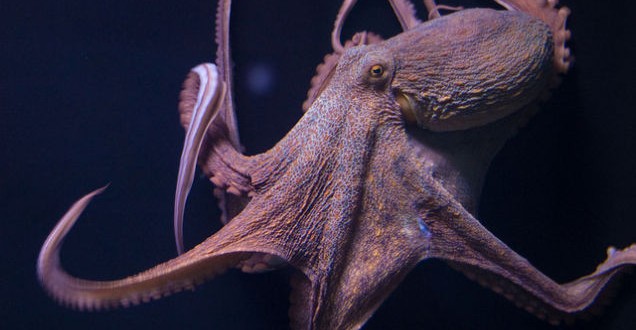The mystery of how octopuses manage not to get tangled up in their own tentacles has finally been solved.
Published in the journal Current Biology, researchers from the Hebrew University of Jerusalem noted it has long been known that octopuses do not know where their arms are exactly – so how then, they asked, do they not end up tying themselves up in knots?
They believe a chemical signal in the cephalopod’s skin prevents self-adhesion. Without it, the flexible animals would quickly wind up in a tangle.
“We were surprised that nobody before us had noticed this very robust and easy-to-detect phenomena,” said researcher Dr Guy Levy, from the Hebrew University of Jerusalem in Israel.
“We were entirely surprised by the brilliant and simple solution of the octopus to this potentially very complicated problem.”
The discovery could help researchers designing bio-inspired “soft” robots with tentacle-like manipulators.
Unlike animals with rigid skeletons, octopuses never know exactly where their arms are at any given moment.
Professor Binyamin Hochner, who led the Hebrew University team, said: “Our motor control system is based on a rather fixed representation of the motor and sensory systems in the brain in a formant of maps that have body part co-ordinates.
“It is hard to envisage similar mechanisms to function in the octopus brain because its very long and flexible arms have an infinite number of degrees of freedom. Therefore, using such maps would have been tremendously difficult for the octopus, and maybe even impossible.”
Experiments have confirmed that octopuses lack accurate knowledge about the position of their arms. Given the clingy nature of their suckers, why they did not end up tying themselves in knots was an unresolved mystery.
Tests showed that amputated octopus arms, which remain highly active for an hour after separation, never grabbed hold of octopus skin. Nor did they attach themselves to lab dishes covered with octopus skin or skin extract.
Unlike amputated arms, live octopuses seem able to override the avoidance mechanism when they need to. They will, for instance, sometimes hold on to an amputated arm, especially if it is not one of their own.
The researchers wrote in the journal Current Biology: “The results so far show, and for the first time, that the skin of the octopus prevents octopus arms from attaching to each other or to themselves in a reflexive manner.
Agencies/Canadajournal
 Canada Journal – News of the World Articles and videos to bring you the biggest Canadian news stories from across the country every day
Canada Journal – News of the World Articles and videos to bring you the biggest Canadian news stories from across the country every day



